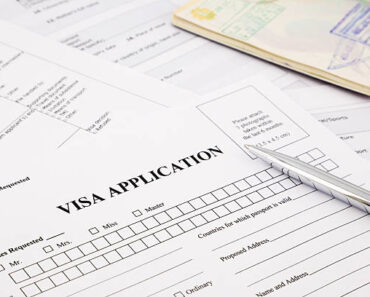This post was most recently updated on April 29th, 2019
Generally, foreign nationals wishing to enter the United States of America must obtain a visa. A visa is an endorsement made on your passport that allows you to enter or stay in a country for a specific period of time. An R1 Visa is just one of many US Visa types.
There are different types of visas. There are long-term and short-term stay visas. Visas also come in categories, depending on the kind of traveler you are and your reason for traveling.
Travelers wishing to enter another country must generally apply in advance sometimes in person at a consular office, by mail or over the internet. As a visa applicant, you will need to establish that you meet all requirements to receive the category of visa for which you are applying.
Types of Visas for U.S Travel
In the U.S, the visa directory is alphabetized from A to V, with each letter representing a category or type. For instance, A1-3 visas are issued to diplomats and foreign government officials. F-1 visas are most commonly granted to international students to study in the U.S. This type of visa is given to individuals who have been accepted into an accredited university or college in the US to pursue academic studies or English language program.
There are mainly two types of immigration visas: Non-immigrant visas for a temporary stay in the country and Immigrant visas for a permanent stay in the country. There are over 60 types of non-immigrants visas available for international citizens.
What is an R1 Visa?
An R1 visa is the non-immigrant visa for religious workers and clergy. You have to be sponsored by a non -profit entity of your religion, along with documents showing your credentials for the position. This visa allows religious workers, that is, persons working in the religious vocation or occupation to work in the U.S. for a period up to 5 years.
An R-1 candidate is a foreign national who is coming to the United States temporarily to work as a minister or in another religious vocation or occupation at least part time,- which is an average of at least 20 hours per week.
Bodies that can sponsor such visas are:
- A non-profit religious organization in the United States;
- A religious organization that is authorized by a group tax exemption holder to use its group tax exemption; or
- A non-profit religious organization which is affiliated with a religious denomination in the United States.
What can I do on an R1 Visa?
You can engage in full time study, get paid for services rendered, apply for a green card or an R2 dependent visa for a spouse or for children under 21 years of age, and travel in and out of the U.S. There are no travel restrictions on the R1 visa.
How long does it last?
An R-1 visa is issued for an initial period of up to 30 months. This can be extended for an additional 30 months. Your total period of stay in the United States in R-1 classification as a religious worker cannot exceed five years (60 months).
Who can Sponsor an R1 visa?
Churches and organizations can be sponsors. In order to sponsor an R-1 visa, the body must be a bona fide non-profit religious organization in the U.S, which is exempt from taxation as described in section 501(c)(3) of the Internal Revenue Code of 1986 or a religious organization that has never sought such exemptions, but would otherwise be eligible for such status.
This visa program is intended for religious workers whose lives are dedicated to religious practices and functions, as distinguished from secular members of the religion.
How do I apply for an R1 visa?
An R-1 visa petition must first be submitted in the United States by the petitioning organization regardless of whether or not the individual being sponsored is inside or outside the United States.
If you are already in the United States in a valid non-immigrant status, you may apply to “change status” as part of the petition.
If you are outside of the US, you will have to apply for an R-1 visa stamp at a United States Consulate abroad after the R-1 petition has been approved.
To qualify, the foreign national must have been a member of a religious denomination having a bona fide non-profit religious organization in the United States for at least two years immediately before the filing of the petition.
A prospective or existing U.S. employer (petitioner) must file Form I-129, Petition for Nonimmigrant Worker, on behalf of foreign nationals (beneficiary) seeking to enter the United States as a nonimmigrant minister, or a religious worker in a religious vocation or occupation.
An R-1 visa cannot be issued at a U.S. Embassy or Consulate abroad without prior USCIS approval of Form I-129. This process allows USCIS to review the petition to determine whether the petitioning organization and the beneficiary have met their respective eligibility requirements for this nonimmigrant classification (R1).
* USCIS is the U.S. Citizenship and Immigration Services- the federal agency tasked with overseeing the lawful immigration of foreign nationals who are temporarily or permanently settling in the United States.
On approval of the petition, the embassy/consulate will then determine whether the foreign national is eligible to receive the R-1 nonimmigrant visa.
What documents are needed?
The petitioner must provide other documentation including-
- A valid determination letter from the IRS establishing that they are a bona fide non-profit religious organization recognized as tax-exempt under a group tax exemption.
- Where a petitioning organization is not classified under “religious organizations” by the Internal Revenue Service, they may establish that they are affiliated with a religious denomination by completing the Religious Denomination Certification in the revised Form I-129. The religious denomination certification should be signed by an organization other than the petitioning organization, and attest that the petitioning organization is part of the same religious denomination as the attesting organization. For instance, a branch of the Lutheran church must certify that another branch is actually part of the greater body- e.g the Lutheran World Federation.
They must also present, like in the first example-
- A currently valid determination letter from the IRS establishing that the organization is tax-exempt, in addition to
- documents establishing the religious nature and purpose of the organization,
- organizational literature describing the religious purpose and nature of the activities of the organization, and
- A religious denomination certification stating that the petitioning organization is affiliated with the religious denomination.
- Proof of compensation. Religious workers generally must be compensated. Compensation may include either salaried or non-salaried compensation. Evidence showing how the organization will compensate the religious worker may include:
- Past evidence of compensation for similar positions;
- Budgets showing money set aside for salaries, leases, etc.;
- Evidence that room and board will be provided to the religious worker.
- If available, IRS documents such as the religious worker’s Form W-2 or certified tax returns must be provided. *A W-2 form is the form that an employer must send an employee and the Internal Revenue Service (IRS) at the end of the year showing an employee’s annual wages and the amount of taxes withheld from his or her paycheck. If the documents are not available, an explanation is required and comparable, verifiable documentation must be provided.
The foreign national or beneficiary must also provide the following-
- Fill out a Nonimmigrant Visa Electronic Application (DS-160) Form. You can access it at www.travel.state.gov.
- A passport valid for travel to the United States with a validity date at least six months beyond your intended period of stay in the United States.
- You will upload your photo while completing the online form DS-160. All photos must be in a particular format specified on the website.
- A receipt showing payment of your US$190 non-refundable nonimmigrant visa application processing fee, paid in local currency. If a visa is issued, there may be an additional visa issuance reciprocity fee, depending on your nationality. The US Department of State’s website can help you find out if you must pay a visa issuance reciprocity fee and what the fee amount is.
- The receipt number printed on your approved I-129 petition.
- Proof of membership of a bona fide non-profit religious organization in the U.S for at least two years immediately before filing for the visa.
- If the religious worker will be working as a minister, a copy of the religious worker’s certificate of ordination or similar documents must be provided. Also needed are documents showing acceptance of the religious worker’s qualification as a minister in the religious denomination, as well as evidence that he or she completed any course of prescribed theological education at an accredited theological institution normally required or recognized by that religious denomination. If the denomination doesn’t require academic qualifications, they must provide their requirements to be ordained as a minister and show a list of duties performed by same.
- The applicant must schedule an appointment for the visa interview at the Embassy/Consulate. A non-refundable visa application fee of $160 must be paid before the interview, and an issuance fee may be paid upon approval of the visa.
Who is a Minister?
You can be classified as a minister of religion if you are authorized by a religious denomination and fully trained according to the denomination’s standards to conduct religious worship and to perform other duties usually performed by authorized members of the clergy of that denomination. Ministers include pastors, reverends, priests, etc. People with religious vocations or occupations also qualify for R1 status such as nuns, monks. Other examples of religious occupations are liturgical workers, religious instructors, religious counselors, cantors, catechists, workers in religious hospital or religious health care facilities, missionaries, religious translators or broadcasters. The applicant must be able to show their relevant status within the religious organization.
Caution: Working within a religious facility does not, in itself, qualify a lay person for R-1 classification. Your duties must be related to a traditional religious function. Such duties do not include positions that are mainly administrative or support staff. Examples of occupations that would NOT qualify are janitors, maintenance workers, clerks, and fund raisers. The job must have a “religious significance”. However, limited administrative duties that are incidental to the religious workers’ functions are permissible.
Note: religious study or training for religious work does not constitute a religious occupation for purposes of seeking R1 status, but a religious worker may pursue study or training incident to status.




Hello Dems,Good day.
I recently filled a u.s visa application online and got an appointment by August. I omitted filling my annual salary? and again I mistakenly ticked yes Where it was asked if I have travelled abroad for the past five years? because initially I thought the question meant if I have travelled abroad before and actually I have travelled abroad before but to Hong Kong which I indicated. So I would like to know if I am still safe???
Yes Nazam,
You usually would have the opportunity to correct those errors during the interview.